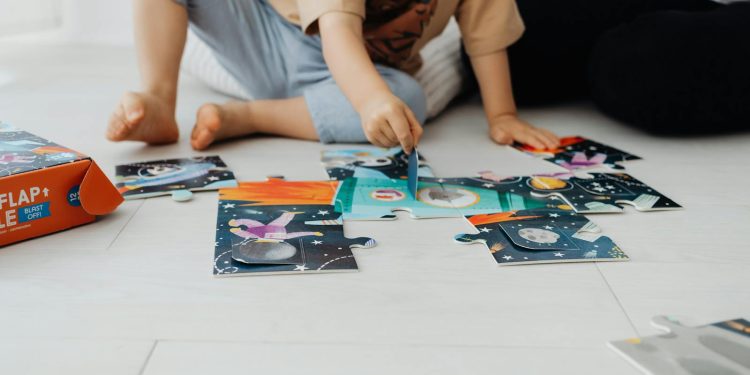The first few years of your baby’s life are a period of incredible growth and change. During this time, your baby’s brain is developing at a rapid pace, forming connections that will shape their abilities, emotions, and learning for the rest of their lives. As a parent, you play a crucial role in this process. There are many simple ways you can help stimulate your baby’s brain development and create an environment that nurtures their natural curiosity and learning abilities. In this guide, we’ll explore some effective ways to boost your baby’s cognitive development and set them up for a healthy, happy future.
1. The Power of Touch and Sensory Experiences
From the moment your baby is born, their world is filled with new sensations. Sensory experiences, such as touch, sound, sight, and even taste, play a vital role in stimulating their brain. One of the most impactful ways you can stimulate your baby’s brain is through the power of touch. Holding your baby close, giving gentle massages, and cuddling them provide physical comfort while helping their brain form strong connections related to security and love.
Tactile stimulation is not only comforting but also essential for their physical and emotional growth. You can enhance your baby’s sensory experiences by giving them objects with different textures to touch and explore. Soft toys, fabrics, and sensory play mats can be wonderful tools for this purpose. The simple act of allowing your baby to reach out, grab, and feel different textures helps build their neural pathways and improve hand-eye coordination.
2. Talk, Sing, and Read to Your Baby
One of the most powerful tools for stimulating your baby’s brain development is the sound of your voice. Your baby loves to hear you talk, and it doesn’t matter whether you’re narrating your day, describing what you’re doing, or singing lullabies—your words help their brain develop language and communication skills. Talking to your baby frequently also helps them learn about the rhythm and sounds of speech, forming the foundation for their future language abilities.
Singing to your baby is another wonderful way to bond while stimulating their brain. Songs, especially those with repetitive lyrics, help introduce new words and sounds. Even if you don’t think you have a great singing voice, your baby loves the sound of it. Additionally, reading to your baby—even in the earliest months—is an excellent way to promote brain development. The rhythm of your voice, the pictures in the book, and the interactive nature of reading help foster language development and a love for learning.
3. Encourage Movement and Physical Play
Physical activity is not just beneficial for your baby’s body—it also plays a major role in their brain development. Encouraging your baby to move, whether it’s reaching for toys during tummy time or learning to crawl, helps strengthen their motor skills and builds neural connections related to movement and coordination. During tummy time, you can place colorful toys or objects just out of reach to motivate them to lift their head, reach, and eventually crawl.
As your baby grows, create a safe space where they can explore, roll, and practice their motor skills. Babies are naturally curious, and providing them with opportunities to move and explore their environment is crucial for their physical and cognitive growth. Simple activities like placing toys at varying distances or playing gentle games of “peekaboo” can do wonders for their spatial awareness and problem-solving skills.
4. Foster Social Interaction
Your baby’s social interactions are important for brain development as well. Babies learn about emotions, empathy, and social cues through interaction with parents, siblings, and caregivers. Spend time making eye contact, smiling, and responding to your baby’s coos and expressions. This back-and-forth communication is not only adorable, but it’s also laying the groundwork for their emotional intelligence.
Playing with other babies and children, even if they are not actively interacting, also provides valuable learning experiences for your baby. Observing other children play and engaging in parallel play (playing alongside but not directly with others) introduces your baby to new experiences and social cues that will help them as they grow.
5. Provide Stimulating Toys and Playtime
The right toys can make a huge difference in helping your baby’s brain develop. Choose toys that encourage exploration, problem-solving, and creativity. For newborns and younger infants, high-contrast black-and-white toys are visually stimulating, as they are easier for them to see and focus on. As your baby grows, toys like building blocks, stacking rings, and activity centers can promote fine motor skills and hand-eye coordination.
Playtime is the perfect opportunity to introduce new experiences to your baby. Toys that make sounds, light up, or have different textures are great for sensory stimulation. You don’t need an overflowing toybox—simple household items can also be fascinating for babies. Pots and pans, plastic containers, or even a simple cardboard box can capture your baby’s attention and stimulate their imagination.
6. Create a Safe Environment for Exploration
Babies are natural explorers. As they grow, they become increasingly curious about the world around them, and their desire to explore is an essential part of their brain development. Create a safe environment that allows your baby to move around and explore freely. Make sure that dangerous objects are out of reach, and provide opportunities for your baby to practice crawling, standing, and walking.
Exploring different rooms, looking out the window, or touching different objects around the house stimulates curiosity and cognitive development. Providing age-appropriate challenges—such as placing a favorite toy slightly out of reach—helps your baby learn to problem-solve, which is key to brain development. Encouraging this sense of exploration allows your baby to become more confident and independent over time.
7. Embrace Routine and Repetition
Babies thrive on routine, and repetition is an important part of their learning process. Daily routines create a sense of stability and predictability, which helps babies feel safe and secure. This emotional security is important for brain development because it allows babies to focus on learning new skills rather than worrying about the unexpected.
Repetition also plays a key role in helping babies learn new things. Whether it’s singing the same song, reading the same book, or playing a favorite game, repeating activities helps reinforce neural pathways and strengthen connections in your baby’s brain. It might feel monotonous to you, but for your baby, it is how they learn best.
8. Practice Positive Reinforcement
Babies respond well to positive reinforcement. When your baby smiles, coos, or accomplishes a new skill, such as rolling over or clapping their hands, responding with enthusiasm and praise reinforces the behavior and encourages further development. Positive reinforcement builds self-esteem and motivates your baby to continue exploring and learning.
Smiling, clapping, and offering encouraging words all signal to your baby that they are doing something positive, which in turn promotes confidence and cognitive development. Your support and encouragement are invaluable as your baby learns about the world around them.











